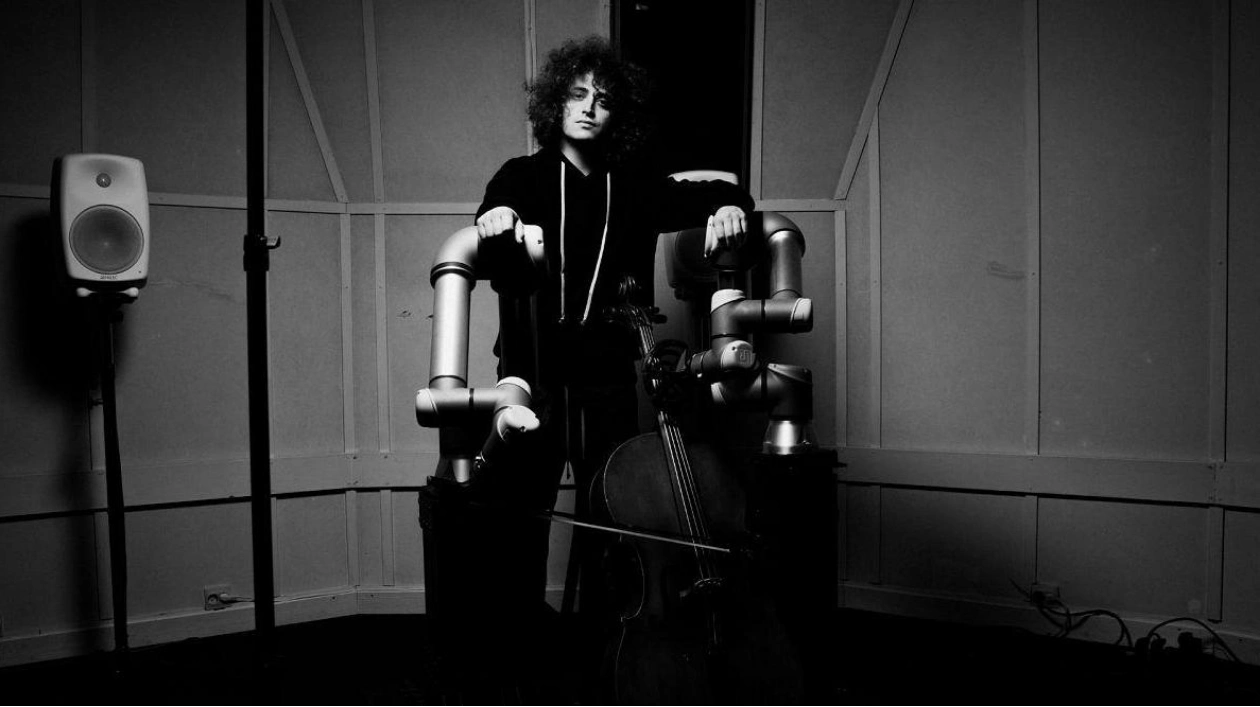As the orchestra gathered for the final piece of the evening at Malmö Live Concert Hall, an unusual participant was spotted in the pit. Instead of a human cellist, a robot took center stage for Swedish composer Jacob Mühlrad’s latest creation. Two mechanical arms emerged from the ground, one holding the bow and the other pressing the neck of the cello. The robot, known as Veer (bot), had been meticulously programmed to perform the piece titled ‘Veer’ flawlessly. As the orchestra played, Veer (bot) stood out both emotionally and physically, delivering sustained notes that contrasted with the human musicians. This was no mere machine randomly striking strings; every detail had been carefully considered. “Even the vibrato can be programmed,” Mühlrad explained to Euronews Culture. Mühlrad, the composer behind Veer (bot)’s debut, collaborated with Swedish composer and researcher Frederick Gran to develop the robot. “We started a conversation, and every week, he developed something new,” Mühlrad recalled. As Gran added features like synchronization and tonal capabilities, Mühlrad wondered if the robot had ever played with an orchestra. When he learned it hadn’t, he set out to compose a piece for Veer (bot) to perform live with a full orchestra. The piece, ‘Veer’, was the final composition in a concert dedicated to Mühlrad’s work by the Malmö Symphony Orchestra. Although Mühlrad envisions a future version of the robot responding to a conductor, this performance was entirely pre-recorded. Unhindered by human limitations, Veer (bot) can execute complex pieces that would be impossible for humans. “It’s similar to a MIDI Keyboard,” Mühlrad said, noting how musicians program digital keyboards to play beyond human capabilities. “Perhaps it’s more complex with the cello,” he added, considering factors like intonation and bow pressure. While ‘Veer’ was a straightforward piece, Mühlrad sees potential for the technology in exploring musical realms beyond human reach. From microtonal compositions for robot quartets to impossibly slow glissandos, the possibilities are endless. However, Mühlrad is clear about the unique value of human musicians. “The human is… incomparable,” he said. “Seeing a human grip the cello and project their inner expression is pure magic.” Interpretation is a cornerstone of classical music, reflecting the performer’s state of being, which robots cannot replicate. Veer (bot) serves as a new tool for musicians, complementing human players. Mühlrad imagines music that integrates both human and robot cellists, each with distinct roles. The complexity of musical interpretation shifts from the conductor to the composer. ‘Veer’ was chosen to showcase the robot’s soul and expression, even with pre-programming. “At the Malmö concert, there was a moment with slightly too little pressure, creating a harmonic tone an octave above,” Mühlrad recalled. This small detail highlights the interpretive depth of live music. While some may question the emotional impact of robot music, Mühlrad points out that electronic synthesizers often evoke strong emotions. For him, Veer (bot) is an exciting addition to a composer’s toolkit, not a replacement for human musicians. “I wouldn’t be afraid,” he says. “Humans can’t be replaced.”
Source link: https://www.euronews.com






